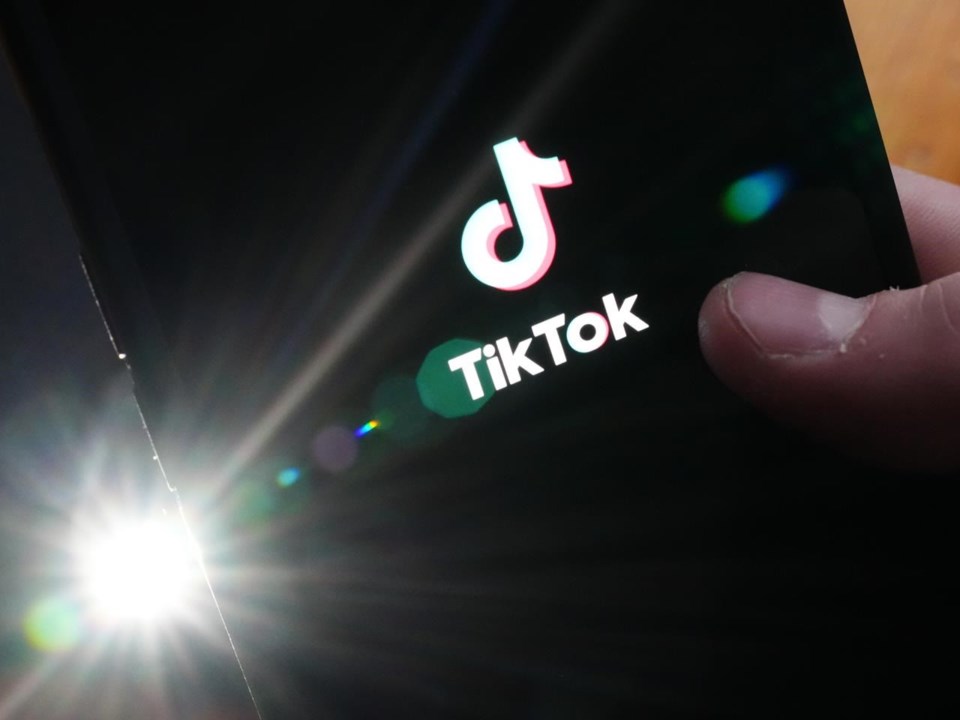TORONTO — TikTok is experiencing the fastest rate of growth among Canadians, but is also the least trusted social media platform in the country, a new report said.
The research published Thursday by Toronto Metropolitan University showed the short video app has nearly tripled its reach since 2019 with 29 per cent of survey respondents on the app, up from 10 per cent.
However, trust levels for social media platforms declined significantly from 2021, with just one in 10 Canadians having high trust in such apps. Trust in TikTok was particularly low, falling so far that the app replaced Facebook as sa╣·╝╩┤½├Į's least trusted social media organization.
Sam Andrey, director of policy and research at the Leadership Lab at Toronto Metropolitan University, attributed falling faith in the apps to a succession of scandals. At Facebook, there was the 2018 Cambridge Analytica data debacle and allegations suggesting the company had a role in electing Donald Trump as U.S. president and encouraging Brexit.
Meanwhile, Twitter courted its own controversy with Elon Musk, who took over the app last year, rapidly see-sawing on policy matters and angering advertisers and users.
"The controversy around TikTok and the Chinese parent ownership and where our data is going ... has been swirling for awhile, so I think that's breaking through in the Canadian consciousness," added Andrey.
His research was based on an online survey of 2,022 Canadians above the age of 16 conducted in October, months before the federal and provincial governments banned TikTok from its employees' phones as tensions with China intensified.
Concerns about the app largely stem from the fact that its parent company ByteDance is based in China, where laws allow the country to demand access to user data.
The research also comes as social media apps grapple with mounting calls for tech giants to be regulated and several countries review privacy and anti-hate legislation that is bound to weigh heavily on platforms.
But the apps that stand to be regulated are still widely used in sa╣·╝╩┤½├Į.
Some 91 per cent of survey respondents used YouTube, while 82 per cent were on Facebook, 77 per cent on Facebook Messenger and 55 per cent on Instagram.
Survey respondents gave TikTok, Facebook and Twitter the lowest level of trust when asked to assess the faith they had in various organizations to act in the best interest of the public.
Trust in the three tech companies was far lower than in corporate and media brands such as Canadian Tire, CBC/Radio-sa╣·╝╩┤½├Į, CTV, Tim Hortons, the Globe and Mail, Loblaws, Bell sa╣·╝╩┤½├Į and Shell, as well as international giants including Google, Wikipedia, Microsoft and Apple.
Only one in 10 of the people surveyed said they have a high degree of trust in Facebook, TikTok or Twitter.
About 50 per cent of respondents had low trust in TikTok, up from 36 per cent in 2021, while only seven per cent had high trust in the app, down from 16 per cent over the same period.
The research said 42 per cent had low trust in Facebook, up from 37 per cent a year prior. Some 40 per cent per cent had low trust in Twitter, up from 31 per cent in 2021.
The study also analyzed hate speech and harassment.
People in sa╣·╝╩┤½├Į reported relatively frequent exposure to online hate speech, though the proportion reporting that they see hate speech online at least a few times per month fell from 48 per cent in 2019 to 41 per cent in 2022.
"There's this sense that things are getting worse, in part because of the public discourse around it ... but content moderation has got better," Andrey said.
"(Companies) are more likely to take things down, to label things, than they were, say, in 2018."
However, two-thirds of all respondents said governments should require online platforms to act responsibly and reduce the amount of harmful content on their platforms.
More than 80 per cent of Canadians support requirements for platforms to quickly remove reported illegal content, block automated or bot accounts, label information verified as false and provide tools for users to fact check online content.
Andrey acknowledged balancing rights and freedoms is "tricky stuff" but suspected many people are in favour of a further government clampdown after the Freedom Convoy shut down a large swath of Ottawa last year.
"Maybe ... that served as a reminder of the threats here at home to allowing sort of conspiratorial misinformation and hate to spread," he said.
"So I think that event was a real Canadian phenomenon that has maybe sharpened some Canadian policy attitudes."
This report by The Canadian Press was first published March 9, 2023.
——
Meta, which owns Facebook, funds a limited number of fellowships that support emerging journalists at The Canadian Press.
Tara Deschamps, The Canadian Press



